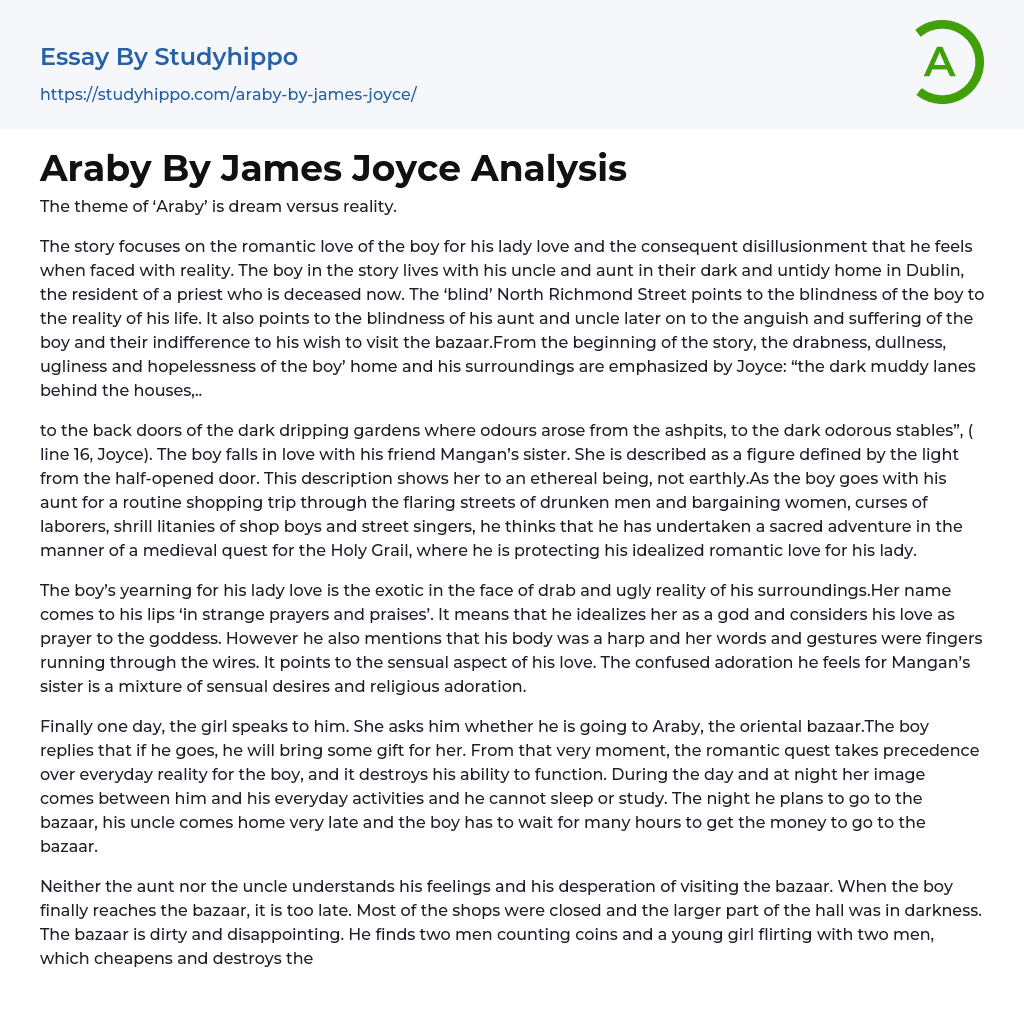The theme of ‘Araby’ is dream versus reality.
The story focuses on the romantic love of the boy for his lady love and the consequent disillusionment that he feels when faced with reality. The boy in the story lives with his uncle and aunt in their dark and untidy home in Dublin, the resident of a priest who is deceased now. The ‘blind’ North Richmond Street points to the blindness of the boy to the reality of his life. It also points to the blindness of his aunt and uncle later on to the anguish and suffering of the boy and their indifference to his wish to visit the bazaar.From the beginning of the story, the drabness, dullness, ugliness and hopelessness of the boy’ home and his surroundings are emphasized by Joyce: “the dark muddy lanes behind the hou
...ses,..
to the back doors of the dark dripping gardens where odours arose from the ashpits, to the dark odorous stables”, ( line 16, Joyce). The boy falls in love with his friend Mangan’s sister. She is described as a figure defined by the light from the half-opened door. This description shows her to an ethereal being, not earthly.As the boy goes with his aunt for a routine shopping trip through the flaring streets of drunken men and bargaining women, curses of laborers, shrill litanies of shop boys and street singers, he thinks that he has undertaken a sacred adventure in the manner of a medieval quest for the Holy Grail, where he is protecting his idealized romantic love for his lady.
The boy’s yearning for his lady love is the exotic in the face of dra
and ugly reality of his surroundings.Her name comes to his lips ‘in strange prayers and praises’. It means that he idealizes her as a god and considers his love as prayer to the goddess. However he also mentions that his body was a harp and her words and gestures were fingers running through the wires. It points to the sensual aspect of his love. The confused adoration he feels for Mangan’s sister is a mixture of sensual desires and religious adoration.
Finally one day, the girl speaks to him. She asks him whether he is going to Araby, the oriental bazaar.The boy replies that if he goes, he will bring some gift for her. From that very moment, the romantic quest takes precedence over everyday reality for the boy, and it destroys his ability to function. During the day and at night her image comes between him and his everyday activities and he cannot sleep or study. The night he plans to go to the bazaar, his uncle comes home very late and the boy has to wait for many hours to get the money to go to the bazaar.
Neither the aunt nor the uncle understands his feelings and his desperation of visiting the bazaar. When the boy finally reaches the bazaar, it is too late. Most of the shops were closed and the larger part of the hall was in darkness. The bazaar is dirty and disappointing. He finds two men counting coins and a young girl flirting with two men, which cheapens and destroys the boy’s sense of an eastern enchantment: “I saw myself as a creature driven and derided by vanity; and
my eyes burned with anguish and anger”, ( last line, Joyce).
John Brugaletta and Mary Hayden express their view of the boy: “He has been attracted by the "magical name" of the bazaar and has travelled there for the greater glory of that other magical name, the name which springs to his lips in prayers and praises. The vision had been his alternative to the real world, had indeed become at one point so realistic as to apparently fuse with reality for him. But that vision ..
. proved too fragile for a world of real older girls, money, drunken and indifferent uncles, and the necessary crassness of day-to-day existence...
.Anguish, however intense, is a perfectly appropriate reaction”, (17). The boy is finally disillusioned due to his awakening to the world. The tawdry superficiality of the bazaar is opposite to the image of an “Oriental Enchantment” and it removes his blindness. He realizes that life and love differ from the dream.
Araby, which to him was the symbolic temple of love, is actually profane. The bazar is a market place which thrives on the motive of profit and love is presented as an empty and passing flirtation.
- Book Summary essays
- Metaphor essays
- Reader essays
- Rhyme essays
- Literary devices essays
- Villain essays
- Books essays
- Genre essays
- Literary Criticism essays
- Writer essays
- Protagonist essays
- Simile essays
- Poem essays
- Book Report essays
- Book Review essays
- Greek Mythology essays
- Plot essays
- Tragic Hero essays
- Coming of Age essays
- Play essays
- Rhetoric essays
- Rhetorical Question essays
- Translation essays
- Understanding essays
- Reason essays
- Character essays
- Letter essays
- American Literature essays
- Literature Review essays
- Utopia essays
- Poetry Analysis essays
- Dante's Inferno essays
- Between The World and Me essays
- Incidents in The Life of a Slave Girl essays
- Flowers for Algernon essays
- Myth essays
- Everyday Use essays
- Boo Radley essays
- Genesis essays
- Richard iii essays
- Alice in Wonderland essays
- On the road essays
- Ozymandias essays
- The Nightingale essays
- Holden Caulfield essays
- Animal Farm essays
- 1984 essays
- A Hanging essays
- Shooting An Elephant essays
- A Tale Of Two Cities essays




